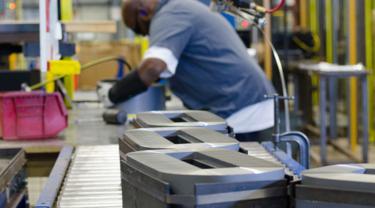Ron Harper still remembers a single phrase from a marketing course more than two decades ago. In fact, during the 20 years he’s run Burlington’s Cogent Power, it’s been a crucial part of day-to-day operations.
“It just stuck with me, but it is so true,” says the Cogent president. “If you are part of your customer’s costs, you will be cut. If you are part of their value, you will grow.”
Ascribing to that business mantra has worked. Since being founded more than 40 years ago, the electrical steel supplier has grown to become one of the globe’s best in its industry. Now a subsidiary of Indian giant Tata Steel, Cogent specializes in cold-rolled steel used to make electrical devices like transformers, motors and generators.
Currently, the U.S. accounts for 60 per cent of Cogent’s overall sales, with Mexico representing approximately seven per cent of exports.
Under Harper’s leadership, the company has grown from 30 people two decades ago to reach its current 300 employees. It opened a second facility – a 125,000-square-foot facility – in Burlington in October 2015.
Cogent’s growth hasn’t been without temporary setbacks. About 10 years ago, the company closed plants in Mexico and another in Connecticut and consolidated operations back to Canada.
“We were ahead of our time in Mexico,” Harper explains. “We opened it up because we had a couple of sizeable contracts with Mexican transformer manufacturers, but it turned out be a feast and famine supply chain. We either had more orders than we could produce and all due now, or we had none.”
Being part of a large multinational has given Cogent a competitive advantage in the global economy, including the freedom to map out plans for the future and how it can be different from its competitors in a tough global economy.
“Unlike our competitors, we look for long-term business relationships,” Harper says. “We aren’t looking for orders this week or contracts this year – we are looking for long-term supply relationships with our clients.”
An example of this commitment to long-term partnerships is how Cogent developed one of its larger customer relationships today. While filling smaller orders for five years, the company was figuring out where it could add value.
“We took the time to develop trust and add value to the relationship before the timing was right to take on a larger responsibility,” says Harper.
Moving away from purely transactional relationships has further helped the company develop key partnerships in its supply chain with like-minded companies.
“We’ve selected our customers strategically and wisely,” Harper says. “They need to fit our value system and must have the desire to grow and increase their market share. It’s a lot like the way Japanese companies have developed. They don’t shop around every year for a new supplier. They stick through the ups and the downs with that customer.”
That Japanese influence is also evidenced in Cogent’s 10-year commitment to lean manufacturing, which the company not only practices, but also leverages by providing lean training to customers to help them streamline their operations.
Cogent also applies lean principles in its global supply chain. While not easily done, it’s an area that Harper says more companies should focus on to improve overall profitability.
“[Leaning out the supply chain] was a real challenge,” says Harper. “Steel mills like to send you boatloads of material, and ‘on-time’ delivery means they shipped it during the month you asked for it.”
Harper and his team worked with all of Cogent’s suppliers to develop a pull system – a manufacturing system based on actual daily demand.
“It took a very long time; it took a lot of education and it took a lot of energy on our part to make sure there was a shared value created,” Harper adds. “It’s made a huge impact on the amount of inventory investment we make.”
Cogent’s commitment to adding value to its customers’ businesses, in part by making supply chains more efficient, is perhaps best exemplified in its relationship with its largest customer, a U.S.-based manufacturer.
“We are moving closer and closer to single piece production flow [an ideal state of efficient operations],” Harper says. “Our production order and sequence and flow identically matches their production, position and flow. There’s very little inventory in between.”
According to Harper, abiding by the business mantra he learned in marketing class more than 20 years ago has provided long-term gains.
“For us, it’s about sustainability,” says Harper. “It’s been very important to us to develop a value proposition that includes helping our customers. If the value we provided was based solely on cost, we wouldn’t be in the position we are in today.”





